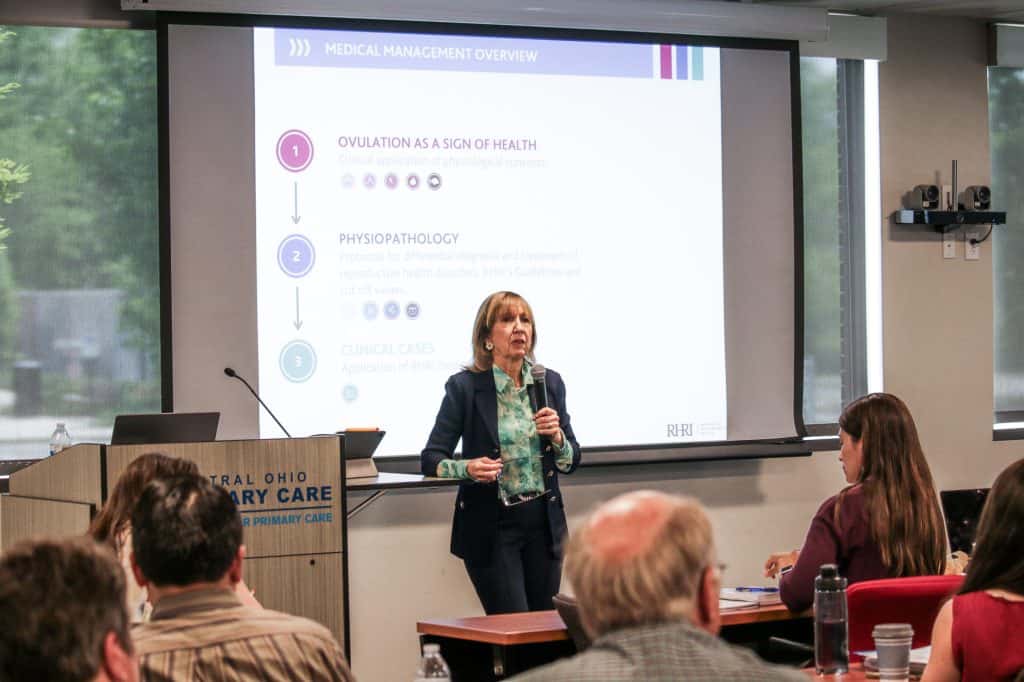PCOS is Common and Yet is not Being Diagnosed
Polycystic Ovary Syndrome (PCOS) is the most common hormonal disorder among reproductive-age women. It can be the cause of up to 75% of infertility for women. Undiagnosed and untreated, it causes infertility, and can contribute to long-term health challenges such as diabetes and stroke.
In spite of the widespread presence of PCOS, it’s been estimated that 70% of women who suffer from PCOS have not been diagnosed. FEMM’s medical providers are on hand to change that.
Cause and Effects of PCOS
There can be multiple hormonal causes for PCOS, but in each case, such as too many androgens, or too much insulin, ovulation is disrupted.
Why might this be a problem? Let’s back up a minute and talk about the science of your reproductive cycle.
During a normal cycle, your brain sends the first signal (FSH), which selects a follicle inside the ovary. The follicle is a fluid-filled sac that will release an egg. That follicle produces estrogen. When estrogen rises to a certain level, the ovary signals the brain, and the brain triggers LH (luteinizing hormone).
LH helps to mature the follicle and egg, and with the help of progesterone, causes the follicle to rupture. An egg is then released into the fallopian tubes, where it awaits fertilization.
When too many androgens are produced, or too much insulin is generated, this delicate process is disrupted. Follicles are recruited, but a dominant follicle doesn’t emerge at the right time, disrupting ovulation. If ovulation doesn’t occur, fertilization can’t happen.
PCOS is linked to other serious health issues, too. It increases a woman’s risk for Type 2 Diabetes, cardiovascular disease, postpartum depression, psychological and behavioral disorders, and endometrial, ovarian, and breast cancer. Getting to the root cause of a PCOS diagnosis is critical for long-term health, as well as achieving fertility goals.
Medical providers! Take the FEMM course on managing PCOS.
Symptoms of PCOS
If you have PCOS, you might experience one or more of these very common symptoms: weight gain, acne, hirsutism (excess hair, usually on the face), and hair loss. You also might have irregular cycles or missed periods and experience difficulty in getting pregnant or suffer miscarriages. Some women with PCOS have fluid-filled sacs (cysts) form in their ovaries—although this doesn’t happen for everyone.
A good way to monitor for PCOS is to observe your daily biomarkers associated with hormonal activity and note them on a chart. Keeping this record helps you to notice the patterns of your cycle and notice if something is amiss. If you observe the symptoms mentioned above or continuous mucus throughout your cycle, a period that’s irregular in length, or no menstruation at all, you could be seeing signs of PCOS.
A great way to do this is with the FEMM app, which will also help to flag irregular cycles and remind you to reach out to get educational or medical input.
The next step is to talk to a medical provider—one who will work to identify the root cause of your symptoms and map out a proper treatment plan.
FEMM medical providers always assess over a dozen hormones and review a woman’s clinical history and cycle data in order to diagnose and treat the underlying causes of her symptoms.
Find a FEMM medical provider who will get to the bottom of your PCOS.
How Do You Treat PCOS?
If you struggle with PCOS, don’t despair—you have effective treatment options!
Many medical providers like to manage symptoms of PCOS using birth control. While hormonal contraceptives can mask symptoms certain symptoms like acne, they do not restore a woman’s health or ovulation.
The good news is that simple medical treatments, along with changes to your diet and exercise can be remarkably effective in treating PCOS! Here at FEMM, we emphasize a strong focus on nutrition, exercise, and sleep. Adopting a healthy lifestyle is critical to overall and hormonal health, and collaboration with a nutritionist can be an important part of successful treatment.
In particular, the “PCOS diet” can be a good way to combat symptoms and regain health. This nutrition plan involves avoiding starchy, sugary foods and processed and red meats and choosing foods that are high in fiber; lean proteins like fish and chicken; and anti-inflammatory foods (such as tomatoes, spinach, blueberries and strawberries).
In addition to lifestyle modifications, medical care is almost always needed to restore health and manage the underlying symptoms over time. Working with a FEMM medical provider allows you to understand the root cause of your symptoms, and to make the medical and lifestyle choices you need to get the health outcomes you want over time.
No matter what PCOS symptoms you suffer—and whether or not you’re trying to get pregnant—the ultimate goal is to restore and improve health. Since ovulation is a sign of health, understanding and monitoring this with your cycle chart is a powerful tool to take control of your health and fertility goals today.
Hope for the Future
FEMM is here to reduce your struggle with PCOS. You are not alone, and you don’t have to suffer in silence. There are effective ways to treat this hormonal imbalance, and FEMM medical providers are always here for you to help you on your journey to health.
It is possible to pursue your health and fertility goals unhampered by PCOS.








